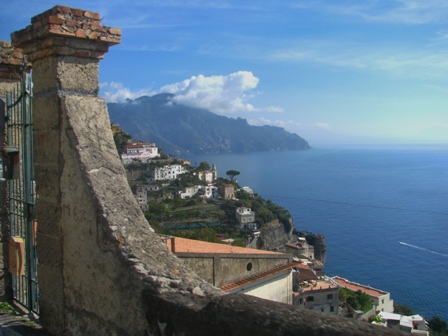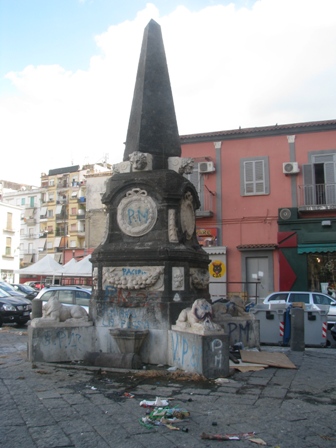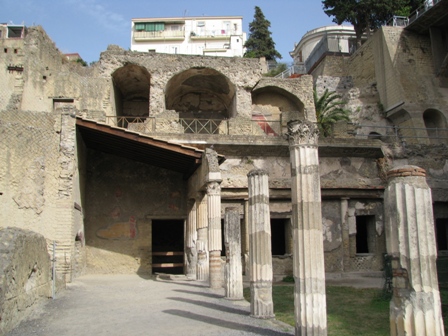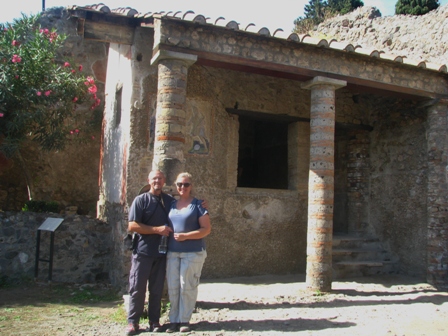Italy: ruins, rubbish and robbery
All photos related to this blog entry can be found at Grant & Julie
Amalfi Coast
Standing in line at the butchers, the man behind the counter, the butcher is discussing the virtues of his sausages with a male customer whilst the wife peruses the glass fronted cabinets deciding on her purchases.She makes her choices, interrupts the men and ensures her selection is just so. The couple move over to the cashiers, the butcher follows and the transaction is complete.
The two men stand in the middle of the store, their chests puffed up like pigeons, heads butted together like stags in battle, their conversation gets louder, more aggressive, their gesticulations get larger and more violent. Spittle was flying. We were expecting fisticuffs over what was being discussed.
The scene erupts in laughter and a jovial pat on the back with promises of seeing each other later and all tension disappears. So this is Italy.
Italian drivers appear to be mad. Mad keen on driving fast everyone believes they are Fangio. Mad keen on overtaking all and sundry no matter what the road rules are. Mad keen on driving whilst talking on mobile phones or reading books and texting (at the same time). You really need your wits about you when you enter the melee!
We left Zagorolo late in the morning for Naples and Camping Spartacus in Pompeii. Vesuvius loomed ominously over Napoli.
Grant had been to Naples 22 years ago on his trusty 1984 Suzuki GSX 250 European touring machine (it was all he could afford to buy in London at the time). Then Naples seemed a typically Italian city. Roads congested with traffic and air congested with pollution. It was chaotic riding as he recalls fondly.
Years have passed and times have changed, the traffic is still chaotic and the pollution is probably no worse. What has changed, dramatically, is the crime and lack of respect some of the population show the city.
Square in Old Naploi
To advertise the "Centro Storrico" as a pleasant place to visit is far from the truth. The whole city area is full of rubbish. We saw a mound of old mattresses thrown out in the gutter that had been attempted to be set alight. Churches with the doors and gates tightly closed and the courtyards filled with empty soft drink bottles, food wrappers and other debris. The wind blows the detritus from the gutter into the alleyways and corners. Areas with rubbish skips are engulfed with all manner of crap so that they are almost invisible. The streets smell of urine.
Sadly this was not the last effect to belay a decaying social structure of the city. Every erect surface was covered in graffiti. It was rife. Some was sentimental or artistic but most was senseless scrawl or anarchic abuse of the government, police and social system. It was everywhere, churches, land marks, ancient monuments, parks, fountains, schools, the tourist information office. No surface was spared. There is no apparent effort on the behalf of authorities to prevent or remove it. Naples seems a city out of control.
At times we felt very uneasy walking in the streets and the day was less than enjoyable.
It was on the crowded train, returning from the city to our campground, that Grant's wallet was stolen. It was a classic situation that you are always aware and prepared for, but take your eye off the ball for one second and you have been done.
Grant takes partial responsibility for what hppened as he inadvertently had placed his wallet in a pocket that was too exposed for the conditions. Not a great deal was lost and pride was bruised a little at being caught out. It turned out that he was not the only one who had things stolen that afternoon, it was a very slick affair.
We had a few days around Pompeii, we climbed Vesuvius and walked the crater rim, spent hours at both Herculaneum and Pompeii ruins.
Back in 67 a.d., Herculaneum was a seaside fishing village and resort town. Now three kilometres from the shore, as the explosion and resultant pyro clastic mud flow buried the village and extended the land by 3 kms. This mud also preserved the town and much of the ancient artwork that adorned it.
Herculaneum
The site was discovered in 1709 but is largely still buried under the new suburb of Ercolano, what has been excavated is a superb example of Roman life in a small roman town. though that said it's then location right on the beach was a good excuse for resort style development for the rich and famous of roman society.
Pompeii, Herculaneum's famous neighbour, on the other hand, was covered not by mud, but ash and pumice. It was was discovered earlier and excavated on a grander scale. It is a massive site and deserves at least whole day of exploration.
Restored house in Pompeii
One of the great things about travel Is the people you meet. Whilst encamped in Camping Spartacus, we met a group of four young Polish men and women who were taking a holiday in Italy by hitch hiking.
These four brave souls spent the night sleeping rough in the Naples train station, has hitched a ride (giant back packs and all) in a four door Smart Car as well as a host of other adventures along the way. Their faith in humanity was refreshing as was their attitude to travelling this way.
We also met Chris, an ex-pat Britt living in Cyprus, who was taking his BMW F800 road bike from the UK home. His enthusiasm and company was a pleasant reprieve to the negativity of Naples.
We have been truly blessed by the wonderful extended summer that Italy has put on for us, there is still much to see and do before the end of the year, as we have another house sitting assignment in Spain to carry us through the Christmas/New Year period. Southern Italy and Tunisia beckon.




